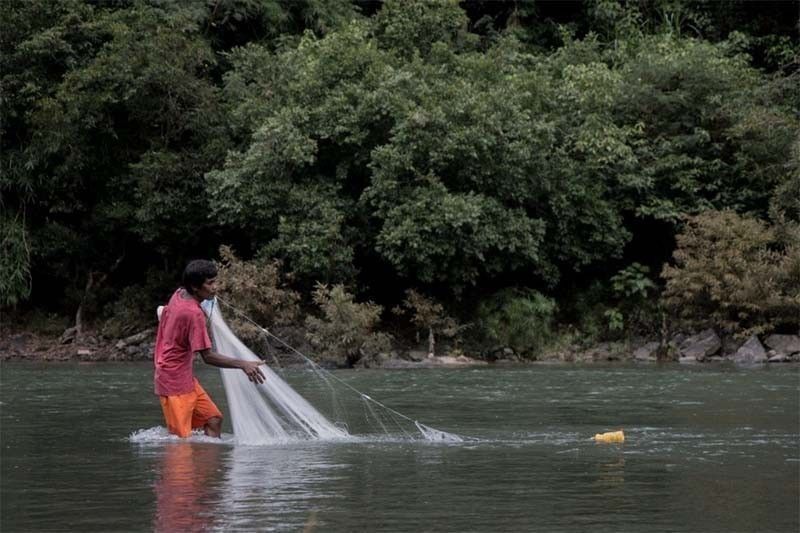Filipino influencers, troll farms tapped for pro-China narratives — study

MANILA, Philippines — The Chinese government is recruiting Filipino social media influencers and troll farms to push polished narratives that favor Beijing, according to a recently published study, with as many as 10,000 fake accounts found to be spreading pro-China narratives.
But besides the flood of pro-Chinese content on social media, the Chinese government is also relying on a more covert form of propaganda: local news reports that minimize Beijing's role in flawed infrastructure projects while shifting blame onto local leaders.
These were the findings of a September 6 report by research group AidData, which examined Beijing's direct and indirect messaging efforts to cast itself as an attractive economic partner for investments in the Philippines.
For years, China has remained as the Philippines' top trading partner, but public opinion has turned solidly against the powerful nation amid more frequent maritime clashes between the two countries in the South China Sea. More than three out of every four Filipinos identify China as the greatest threat to the country, according to an OCTA survey conducted in March and released in June.
"China is not engaging in all these media cooperation and development finance [projects] in a vacuum. It's happening alongside very visible disputes in the South China Sea," Samantha Custer, director at AidData, said on Wednesday, September 11.
Two-pronged strategy. China's social media messaging aim to deflect criticism of its actions in the region by portraying such criticism as mere propaganda by the United States, according to the 51-page AidData study.
Amid its efforts to expand its presence on social media platforms, the Chinese government is also trying to promote the narrative that "discussing, let alone debating, the South China Sea could lead to conflict with the [People's Republic of China], implying that the Philippines is powerless," according to the study.
"PRC state-run or state-influenced media outlets have accounts on most social media channels to amplify their digital content," the AidData study said.
"Less direct is the proliferation of online troll farms and other fake accounts that the PRC can use to spread mis- or disinformation to foreign publics, along with partnerships with social media influencers," it added.
However, the researchers found that Filipinos aren’t buying into these pro-China messages.
While Beijing has paid local influencers to tour China and share positive stories, their impact has been minimal.
YouTube videos promoting China’s image have reached no more than 20,000 views, far less than similar content from India, Europe and the US, according to the study.
Another failed media effort was the Chinese Embassy's release of a video entitled "Iisang Dagat" ("One Sea") at the height of the COVID-19 pandemic in April 2020. While the video sought to highlight positive relations between China and the Philippines, it was seen as a "cynical attempt" to distract from Beijing's maritime aggression.
By April 27, 2020, the video had drawn significant backlash from Filipinos and incurred over 100,000 dislikes.
Beijing has, to a "limited degree," relied on influencers to spread pro-China messages in the Philippines, Custer said. While their efforts so far have yielded mixed results, it is still "something to keep an eye on."
"China has the capacity to learn and to learn quickly. And if it continues to make forays in this area that could be one to watch," she said.
Why do messages from pro-China influencers and troll farms fall flat? Researchers explained that attempting to sway public sentiment is "complicated in practice" no matter the social media strategy or level of investment involved.
Philippine experts interviewed for the report believe that the pro-China accounts' information campaigns "[suffer] from an inability to connect to local audiences [due to] a lack of understanding of Philippine society."
Additionally, posts supportive of China are "undercut" by the Philippine media outlets' coverage of maritime incidents in the contested waters, the study found.
"As a case in point, Philippine outlets regularly post videos of aggressive maneuvers by the PRC’s People's Liberation Army Navy to assert Beijing’s claims in the South China Sea that garner hundreds of thousands of social media views," the study said.
The Marcos administration launched in 2023 its assertive transparency initiative, which involves the regular documentation and publication of China's aggressive actions within the Philippines' exclusive economic zone.
Maritime experts and observers have deemed the initiative a success while keeping a close eye on how it will impact the country's economic relations with China.
Local media a blind spot
However, China has also taken even more subtle approaches to plant positive media coverage of its infrastructure projects in the Philippines, a large number of which were launched under former President Rodrigo Duterte, according to the study.
While Chinese firms are heavily involved in Beijing-backed development projects in the Philippines, the Chinese government's prefers to paint these investments as locally-led initiatives.
Infrastructure projects like the Kaliwa Dam and Chico River Pump Irrigation Project — which drew backlash from environmental and indigenous groups — "were presented as responsive to the Duterte administration’s national development agenda, even as they were heavily funded and implemented by Chinese firms under the [Belt and Road Initiative."
This allows Beijing to obscure its "footprint" on its infrastructure projects in the Philippines and shift any blame for issues like delays or cost overruns onto Filipinos, the study said.
"Interviewees particularly pointed to this pattern as most prominent in the framing of PRC-backed infrastructure projects during the Duterte administration," the study read.
Meanwhile, local Filipino media outlets struggling to turn a profit may have contributed to this framing.
Based on interviews, the researchers said the prospect of higher wages and professional development opportunities offered by China-funded media outlets may appeal strongly to cash-strapped journalists.
"Economic hardships can render local outlets more vulnerable to external influences, including those from PRC-backed entities, subtly favoring Chinese firms by minimizing their involvement in problematic aspects of the projects," the study said.
As a result, news stories favorable to Chinese projects "flooded" the news landscape, and "disagreeable voices are drowned out," it added.
But more direct attempts to feed content to Philippine media outlets do not always guarantee success as public sentiment remains firmly against China in the Philippines.
Researchers noted that even as Chinese state media signed 12 content-sharing partnerships with Philippine media outlets from 2000 to 2023, these have not translated to positive coverage.
- Latest
- Trending


























